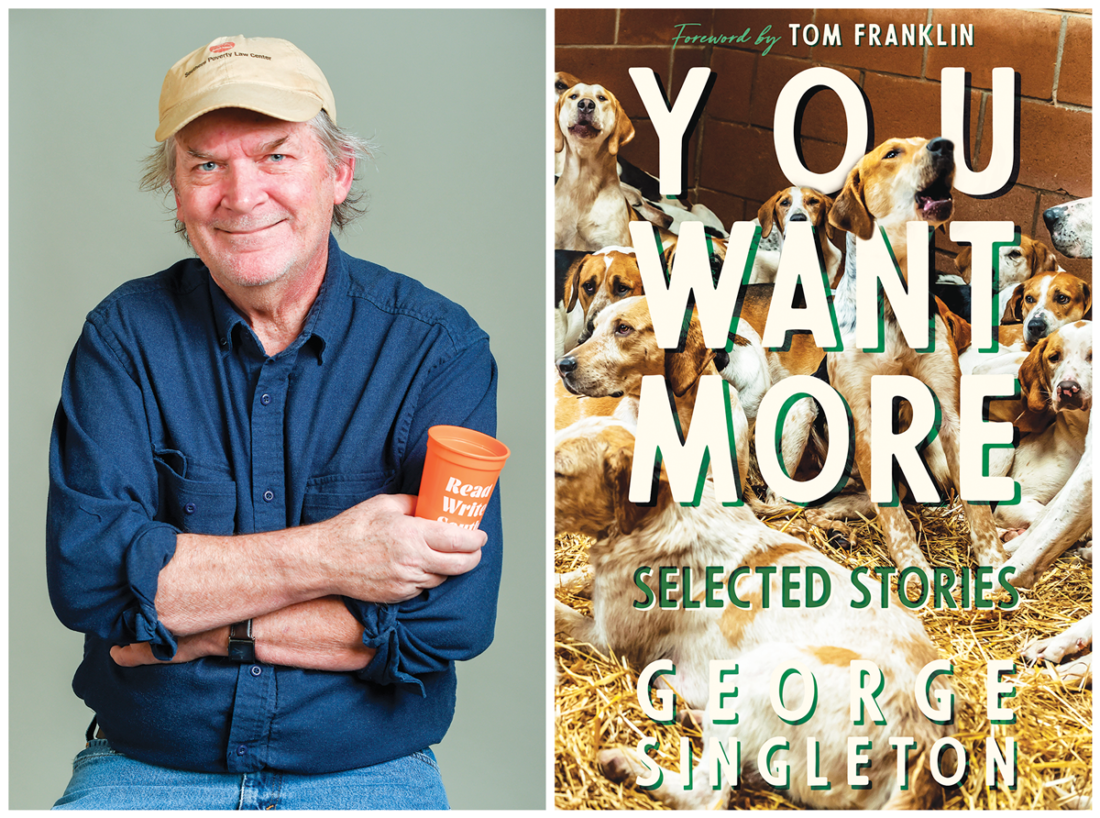South Carolina-based author George Singleton hears voices in his head — and they say the damnedest things. And often, these things wind up becoming the opening lines for his fiction, as is the case in many of the tales in his latest collection, You Want More: Selected Stories.
For example, Singleton opens “Probate” — a story about a dying dog, a strained relationship and a New Age veterinarian — by stating: “We didn’t care, really, about the traveling euthanasia vet’s failed marriage.”
In yet another piece — “John Cheever, Rest in Peace” — Singleton tells of a community’s attempt to exploit the death of fellow resident, Owe Posey. The story begins, “He’d never read a John Cheever story, so that couldn’t have been the reason he traveled, dead of a massive heart attack, across his neighbors’ backyards aboard the Bolens seventeen-horsepower, forty-two-inch-cut riding lawn mower.”
Singleton incorporates absurd situations like these into nearly every tale in the collection, which features 30 previously published works, spanning the author’s 30-year career. However, he never writes with a punchline in mind. Instead, his humor works to underscore his characters’ flaws while simultaneously providing readers momentary relief amid otherwise despairing instances of alcoholism, unemployment, broken marriages, loneliness and a deep sense of purposelessness.
“So many of them are trying to reinvent themselves,” the author says of the blue collar protagonists who populate his stories. “They’re trying to find a reason to live.”
Roofing and writing
Like many of his characters, Singleton held a fair share of manual labor jobs prior to his award-winning literary career. Along with being a house painter, the author worked as a roofer and a garbage collector — experiences that, coupled with his late father only earning a 10th grade education, he feels were formative in shaping the types of individuals he wanted to write about.
“I know that people in the 1% have problems of their own,” he says. “But they don’t really interest me.” Citing the late Southern writer Harry Crews as a further influence in his fiction’s focus, Singleton adds, “Stories should be about people doing the best they can with what they got. That idea’s been kind of etched onto my forehead.”
His former jobs also color the way Singleton views the literary scene. “I get upset when I hear writers just crying, ‘Oh, it’s so hard,’” he explains. “I go, ‘Man, try roofing in the summer.’”
Nevertheless, Singleton acknowledges the frustrations most writers face in their journey toward publication and readership. As a young, aspiring author, he assumed he’d have a book published before the age of 30. Instead, he wound up spending years writing multiple novels that never found a home. Ultimately, his first collection of short stories came out in 2001, when Singleton was 42 years old.
Stubbornness and stupidity, he notes, are essential traits for making it in the literary world.
Deep human truths
It also helps to have a strong community of writers behind you, which Singleton has in spades. Throughout this month, fellow Southern authors will join him during his virtual book tour, including Ron Rash, Clyde Edgerton and Lee Smith. On Friday, Sept. 25, Malaprop’s will host Singleton’s latest online gathering, featuring South Carolina native and writer Bronwen Dickey.
You Want More is also the latest in Hub City Press’ The Cold Mountain Fund Book Series, established in 2019 by author and Asheville native Charles Frazier.
“It was conceived with the intent to highlight both emerging Southern writers as well as established writers who might deserve more attention,” says Meg Reid, director of Hub City Press. Funding for the series, she continues, “gave us an opportunity to create this hardback compendium showcasing why George has become such a deeply beloved writer — because his stories are both hilarious and wise, and always tackle deep human truths.”
One of the essential truths within Singleton’s latest collection is that beauty and meaning manifest in all places. Flea markets, pool halls, basements and the bottoms of man-made lakes all hold potential revelations.
Furthermore, his stories show that professions only tell what a person does for a living. Like all of us, the house painter, the palm reader, the bartender and the cashier each experience instances of joy as well as inevitable moments of failure and loss.
“In a perfect world, if I could ever write a perfect short story, this is what I would want: For someone to go, ‘Man, that made me laugh, it made me cry a little bit and it makes me understand why my neighbor acts the way she does,'” Singleton says.
The author might be too close to his own stories to see that in You Want More, he has achieved his goal.
To register for the free Malaprop’s virtual book event, visit avl.mx/88k.




Before you comment
The comments section is here to provide a platform for civil dialogue on the issues we face together as a local community. Xpress is committed to offering this platform for all voices, but when the tone of the discussion gets nasty or strays off topic, we believe many people choose not to participate. Xpress editors are determined to moderate comments to ensure a constructive interchange is maintained. All comments judged not to be in keeping with the spirit of civil discourse will be removed and repeat violators will be banned. See here for our terms of service. Thank you for being part of this effort to promote respectful discussion.